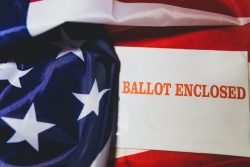
Voting is one of the most fundamental rights of Americans; but more than 240 years after the founding of our country, it is a right still not guaranteed for all citizens.
Arkansas legislators have filed several several bills so far at the General Assembly this year that would make it easier to vote. SB217 would improve the process of voting absentee. HB1202 would require that sample ballots be posted online so voters could review them before voting.
But there is a harmful bill being considered, HB1112, that would make it harder for people to vote.
This bill would amend the state constitution to effectively end the right to vote for people without certain forms of ID. Right now, people can vote in person or absentee provisionally by signing a sworn affidavit to affirm their identity. The county clerks then verify the voters’ identities using voter registration records, and the election commissioners then count the ballots based on the clerks’ recommendation from reviewing those records. HB1112 would end the option to sign an affidavit, so that people who do not own a qualifying ID could no longer exercise their right vote.
At first glance some laws, like those requiring an ID to cast a ballot may seem harmless, but put in the larger context of voter suppression, both past and present, you can see the true damage of these policies.
Last year, the Arkansas Supreme Court removed a measure from the ballot that would have let a commission of citizens redraw our voting districts in a transparent process to allow for greater accountability. It would have helped ensure that gerrymandering in drawing political boundaries would no longer take place.
A few weeks before the measure was removed, Arkansas Advocates for Children and Families hosted a virtual conversation on redistricting. One common theme was the impact the process has had on decreasing the political power of people of color and the impact that has on policies. Racial gerrymandering is not new, and it continues to occur despite protections outlined in the Voting Rights Act and the 14th Amendment.
In 2020, the daughter of political operative Thomas Hofeller released thousands of documents exposing her deceased father’s efforts to gerrymander districts in multiple states with the explicit purpose of diminishing the political power of people of color. The documents showed that Hofeller worked with states’ Republican party leaders to ensure their party’s victory by engaging in redistricting tactics that “packed” voters of color into as few districts as possible, purposely giving them less influence in voting districts in their states overall.
Gerrymandering is just one of many tools used in recent history to marginalize voters of color.
Twenty years ago, no state required a government issued ID to be shown as a requirement for voting. Now, 36 states have voter ID laws, which some analysts have compared to a poll tax. A 2017 study from the University of California at San Diego found that states that implemented strict voter ID laws had lower turnout among Hispanic, Black, Asian American, and multi-racial voters. The most significant effect in turnout was among Hispanic voters, with a 7.1 percentage point drop in general elections.
An analysis by the Brennan Center found that 25 percent of voting-age Black Americans did not have a government issued photo ID, compared to 8 percent of White Americans. The Center also found that new restrictions on early voting during the 2012 election in states like North Carolina disproportionately impacted Black voters who voted early at higher rates than White voters. Adding to those barriers, the report looked at purges in voting rolls and restrictions to voter registration drives that created a combination of policies they call “James Crow, Esquire.”
One Jim Crow-era voter suppression law is still in place. Preventing people who have been convicted of felonies from voting is a long-standing method of disfranchisement. According to The Marshall Project, because of felony disenfranchisement, Black Americans are banned from voting at four times the rate of all other racial groups combined, totaling 2.2. million people. They trace today’s voter suppression directly back to Jim Crow laws that were aimed at preventing Black people from voting, while working around federal laws that made such actions illegal. This led to laws banning people convicted of felonies from voting. A 1977 U.S. Supreme Court Case ruled that the 14th Amendment of the Constitution allows for such discrimination. And disparities seen in policing and arrests that happened in the Jim Crow era are still seen today.
There have been efforts through court cases to end these discriminatory practices. But in 2013, a U.S. Supreme Court ruling struck down a major provision of the Voting Rights Act that required states with a history of discriminatory practices to have proposed changes to voting procedures reviewed by the U.S. Department of Justice or a federal court.
With so much evidence shedding light on racist voter suppression laws and practices, we cannot allow these policies to continue. Disenfranchisement of voters of color must stop. We need federal legislation that will update and expand voter protections and state laws that make voting easier, not harder.
